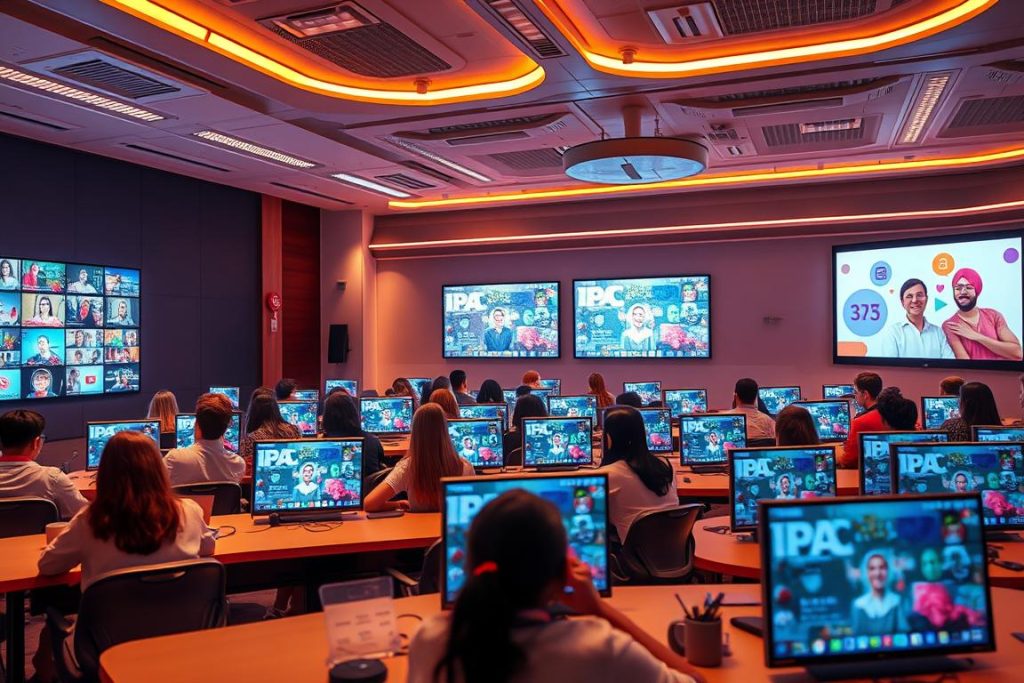Imagine a door leading to your future. It has a big price tag, making your educational dreams seem out of reach. Now, think of a key made of college funding, scholarships, grants, and FAFSA aid. This key opens that door. It lets you enter higher education without worry about money. This key is real and made to help students like you overcome money problems. It pushes you towards achieving academic success and starting a great career.
You can get up to $3,000 from the Educational Assistance Grant for up to four years. You just need to keep up with certain things, like filing your FAFSA or State financial aid application on time and doing well in school1.
Also, there are Learning & Leadership Grants for educators. These grants help people from classroom teachers to support staff. They offer up to $5,000 for projects that make education better and help teachers grow professionally2.
Key Takeaways
- The right educational grant can significantly reduce college costs, enabling you to focus on your studies.
- Filing the FAFSA is a pivotal step in accessing various forms of financial aid.
- Grants, unlike loans, offer financial assistance without the obligation of repayment, easing post-graduation financial stress.
- Research and early application improve your chances of securing the grants that can make all the difference.
- Education grants not only serve the individual but also contribute to empowering a diverse community of educators and learners alike.
Unlocking Financial Support for Students
Finding money for school can seem tough, but there are lots of resources to help make it easier. This section will guide you through finding scholarships and financial aid. It will show you how to get both merit-based awards and need-based help.
Understand the Value of Scholarships and Grants
Scholarships and grants are key for paying for college without taking on debt. It’s important to know the difference between them. Merit-based awards are given for achievements, while need-based aid depends on your financial situation. Knowing this helps you apply the right way.
In Michigan, only half of the students who could apply for FAFSA actually do it. This places Michigan 31st in the country and leaves about $100 million unclaimed3. States like Tennessee and Louisiana do better, with more students completing their FAFSA3.
Discovering Opportunities through Online Databases and Local Resources
It’s crucial to look for scholarships online and in your community. Online databases make finding national and local scholarships easier. Professional groups also offer scholarships for specific careers that might not be well-known.
Local companies and groups often give scholarships unique to your area. They can be easier to get because there’s less competition. These local awards help add to what you can get from bigger national scholarships.
Navigating the Application Process for Successful Outcomes
Understanding how to apply for scholarships is important for getting college funds. Know what’s required and put together a strong application. Deadlines matter a lot; for example, Boston University and Emory University’s scholarships need to be in by December 14.
Showing your achievements well can make your application stand out. Michigan’s Senate Bill 463 might make filling out the FAFSA a must for graduation. It shows how important being ready and informed is3.
Knowing deadlines can give you an advantage. For example, the University of Connecticut – Storrs has different deadlines for different scholarships. The Stamps Scholarship is due November 1, and other scholarships are due December 14.
Searching for scholarships and putting together good applications can really pay off. From local awards to career-specific ones, every step you take is important. Plan well and work hard, and you can find the financial help you need for school.
Free Education Resources for Expanding Your Horizons
The digital age has brought a wealth of open educational resources right to your fingertips, free. These tools are a game changer, especially for those wanting to learn beyond the usual classroom. They open new doors for personal and professional growth.
E-learning platforms like Coursera and edX offer courses from the world’s top universities at no cost discover the best free online courses5. These platforms provide a virtual classroom experience. Here, people from different places can come together to learn and share ideas. This adds a rich layer to everyone’s learning journey.

Adding to this, educational apps have transformed the way we interact with learning material. Tools like Duolingo or Khan Academy let users learn at their own speed. They create a learning space that adjusts to each user’s learning style5.
| Resource Type | Advantages | Examples |
|---|---|---|
| Educational Apps | Interactive, personalized learning | Duolingo, Khan Academy |
| E-learning Platforms | Access to top university courses | Coursera, edX |
| Virtual Classrooms | Real-time interaction, diverse perspectives | Zoom, Google Classroom |
The idea of virtual field trips has also changed how educational trips are viewed. They cut down on costs and planning hassles of actual trips. These virtual trips, like those by the JASON Project, offer rich, immersive learning experiences. Students get to explore the globe without leaving their home6.
The rise of open educational resources has been incredible, thanks to grants and community funds. Now, anyone with the internet can access quality education. Whether you want to boost your job skills, explore creative outlets, or delve into academic topics, these resources are key to learning.
Conclusion
As we explore the world of educational grants, it’s clear there are many ways for students to get past money problems and grab every chance to learn more. A strong conclusion does more than just finish a discussion. It highlights the value of learning and the open doors it leads to. Bringing back main ideas and asking new questions makes the message stronger and keeps readers hooked7.
Teaching how to end things well doesn’t just make students do better by 20%8. It also shows how crucial a powerful finish is, as many teaching materials aim to help students see the big effect of their efforts8. By using tools and strategies that revisit topics or use visuals from places like AVID Open Access or Google Drawings9, teachers are gearing up students for success in further education.
Your journey to doing well in school is built on using 7% of grants meant for learning8 and a whole lot of help from different places and tools. This could mean hitting the standards like CCSS.ELA-LITERACY.RH.6-8.5 or making slides with either Microsoft PowerPoint or Prezi9. You’re set for a bright future, starting with knowing, using, and wrapping up the learning chances ahead of you.
FAQ
What types of college funding are available to help me achieve my educational dreams?
How do scholarships and grants differ?
Where can I find information about available scholarships and educational grants?
What steps should I take to ensure a successful financial aid application?
What are the key components of a strong scholarship application?
What online learning tools and education resources are available for students?
How can I maximize my educational opportunities with limited financial resources?
Are there specific strategies for approaching the Free Application for Federal Student Aid (FAFSA)?
Can I find educational grants for specific projects or initiatives within schools?
How can students with specialized talents find scholarships?
Source Links
- Howard P. Rawlings Educational Assistance (EA) Grant – https://mhec.maryland.gov/preparing/pages/financialaid/programdescriptions/prog_ea.aspx
- Learning & Leadership Grants – NEA Foundation – https://www.neafoundation.org/educator-grants-and-fellowships/learning-leadership-grants/
- Unlock the possibilities of higher education for more students by requiring that all students complete applications for financial aid – The Education Trust – Midwest – https://midwest.edtrust.org/2023/10/16/unlock-the-possibilities-of-higher-education/
- College Financial Aid: Unlocking Access to Higher Education — Elite Educational Institute – https://eliteprep.com/blog/college-financial-aid-unlocking-access-to-higher-education
- Expand Your Horizons – https://www.shrm.org/topics-tools/news/hr-magazine/learning-for-life
- Expand Your Students’ Horizons with Virtual Field Trips – https://www.edmentum.com/articles/virtual-field-trips/
- Conclusions – The Writing Center • University of North Carolina at Chapel Hill – https://writingcenter.unc.edu/tips-and-tools/conclusions/
- Craft informative conclusions – Smekens Education Solutions – https://www.smekenseducation.com/craft-informative-conclusions/
- Social Studies Dimension 4: Communicating Conclusions and Taking Informed Action – AVID Open Access – https://avidopenaccess.org/resource/dimension-4-communicating-conclusions-and-taking-informed-action/

